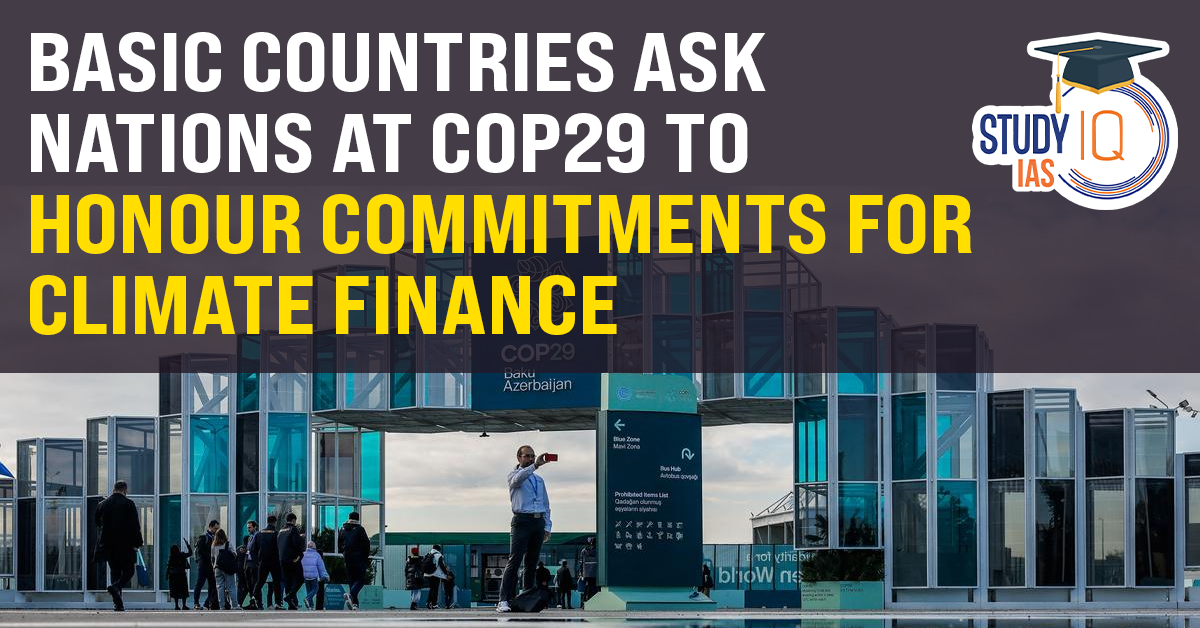Table of Contents
Context
The ongoing COP-29 negotiations in Baku, Azerbaijan, saw India strongly advocating for clear commitments from developed countries regarding climate finance.
More in News
- The New Collective Quantified Goal (NCQG) is intended to replace the $100 billion target agreed upon in 2009, which was fulfilled only belatedly in 2022 and remains insufficient.
- COP-29 is expected to finalise a new figure by 2025 that aligns with the needs of developing countries to mitigate and adapt to climate change without compromising on their development priorities.
Key Highlights of India’s Statement
Climate Finance: A Unidirectional Provision
- India emphasized that climate finance should not be treated as “investment goals” by developed countries but as a “unidirectional provision and mobilization goal” as mandated by the Paris Agreement.
- The responsibility of providing climate finance lies with developed countries, in line with the principles of equity and common but differentiated responsibilities and respective capabilities (CBDR-RC).
Scale of Climate Finance Required
- Current estimates suggest a need for $5–6.8 trillion in climate finance globally until 2030 to meet the goals of mitigation and adaptation in developing countries.
- India proposed that developed nations should commit to mobilising at least $1.3 trillion annually by 2030, through:
- Grants
- Concessional finance
- Non-debt-inducing support
India’s Emphasis on Historical Responsibilities
- India reiterated the principle of historical responsibility, recognizing that developed nations are primarily responsible for past emissions and must shoulder the financial burden.
- The statement highlighted that climate finance provisions should consider:
- Sustainable development goals
- Poverty eradication
- National circumstances, especially for countries in the Global South.
Call for Equity and Avoiding Growth Inhibitions
- India cautioned against introducing new conditionalities in the provision of climate finance that might hinder the growth prospects of developing nations.
- It also emphasised the need for:
- Support mechanisms tailored to evolving national priorities of developing countries.
- Avoiding measures that induce debt or growth-inhibiting constraints.
India’s Role in the ‘Like-Minded Developing Countries’ (LMDC) Group
- India represented the LMDC group at the High-Level Ministerial on Climate Finance.
- The group stressed that addressing climate change requires immediate and ambitious mitigation and adaptation measures, especially for the Global South.
- The LMDC highlighted the increasing visibility of climate change impacts, such as natural disasters, underlining the urgent need for adequate financial commitments.
India’s Criticism of Developed Countries
- India firmly opposed any attempts to include elements in the NCQG that fall outside the scope of the United Nations Framework Convention on Climate Change (UNFCCC) and the Paris Agreement.
- It pointed out the failure of developed countries to fulfill their earlier commitments, thereby undermining trust in the climate negotiation process.


 Indus Water Treaty 1960 Suspended by Ind...
Indus Water Treaty 1960 Suspended by Ind...
 5 Years of SVAMITVA Scheme and Its Benef...
5 Years of SVAMITVA Scheme and Its Benef...
 Places in News for UPSC 2025 for Prelims...
Places in News for UPSC 2025 for Prelims...





















